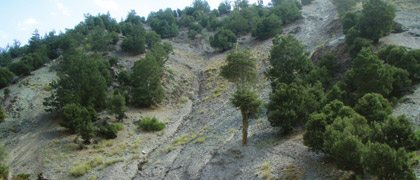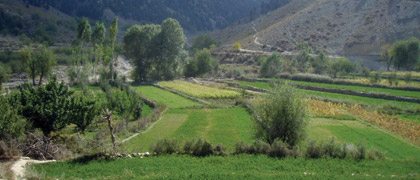Opportunities and Challenges in Afghanistan
War, drought and social collapse have greatly impaired land management and agricultural production systems in much of Afghanistan. Reconstruction or development is needed to create a stronger commercial agricultural sector, including seed. Beyond an immediate need for increased security and stability, a primary detriment in the country is a general lack of effective management of water and land resources. To establish a baseline for agricultural sustainability these key resources must first be better managed.
John Groninger, a professor of silviculture (forestry) at Southern Illinois University and a primary source of information for this column, holds a unique perspective on the agricultural development status of Afghanistan, which he formulated during his nine in-country research and service excursions since 2005. His insight, blended with personal experience and observation, leads to today’s column which offers thoughts and insights into how commercial agriculture and the seed industry may evolve in Afghanistan.
Stark, denuded areas like this one are prevalent in many regions of Afghanistan and pose a significant challenge for growers.
Groninger’s field experience in Afghanistan can be likened to that of basic research performed in a laboratory setting as opposed to being applied research conducted at the field level. His work has contributed significantly to the overall body of knowledge related to agricultural development. What might the seed industry surmise from his investigations and experiences?
As with peeling an onion, strip away the layers dealing with populace and development worker security as well as those related to effective water and land resource management policies: plenty can be gleaned from what remains. Let’s view two contrasting physical and social environments within Afghanistan.
In one investigation, Groninger dealt with watershed health and productivity issues. His experience took place in perhaps the country’s least secure southeastern region (Khost, Paktika and Paktya provinces) and arguably it may exemplify a worst-case scenario for rapid development. Alan Walters, a professor of vegetable breeding at Southern Illinois, was lead researcher on a vegetable production investigation in north-central Balkh province, which was relatively secure by Afghan standards. Walters’ experience may depict a best-case scenario in that a shorter period of time may be required before recognizable results from developmental efforts can be realized.
Best-Case Observations
Significant potential presently exists to further develop and expand the already existing commercial vegetable production industry, as evidenced by Walters in northern Balkh province, in that the climate is arid, soils are favorable and the workforce is abundant. This is true in the presence of an existing strong domestic market and promising export market. Government officials, more than producers, recognize the need for improved cultivars. Most of the cultivars currently planted are landraces and there is potential to both increase production and vegetable quality with the introduction of cultivars better able to adapt to specific localized climates and environments. The vegetable industry thus has the potential to fuel development of a value-added agricultural sector within the nation’s agricultural industry.
Worst-Case Observations
Upper watershed regions (prone to landslides, avalanches and flash floods) are large and disproportionate compared to the smaller areas of the productive land base generally located on numerous arable terraces and in valley bottoms. These factors combined with highly variable monsoon precipitation rates present major challenges for agriculture.
Cultural values held by nomadic people in the region affect agriculture. The accepted practice of moving livestock either up or down a watershed to utilize seasonally available forage (a form of transhumance) has led to persistent overgrazing and general exploitation of precious range resources.
Successful development may first require rehabilitation of grasslands and shrubs in conjunction with adaptation of improved range management practices. Secondly, increased hillslope terracing efforts may be required to stabilize many watersheds. Ultimately, a more efficient irrigation infrastructure may need to be developed to underpin a wide-ranging agricultural industry.
This commercial farm in southeast Afghanistan near the Pakistani border is an example of the potential that exists in the country’s vegetable industry.
Seed Industry Implications
The potential for the seed industry extends well beyond that which may be highlighted by the targeted works of Groninger and Walters. Alfalfa, wheat and rice are currently three important commercial crops. Farmers might expect to benefit from a consistent influx of improved seed stocks.
Irrigated wheat is grown as a primary staple crop contributing heavily to caloric intake in the Afghan diet. Production from irrigated wheat also generates cash revenue from grain sales. Furthermore, dry-land wheat is grown to provide livestock feed and fodder.
Alfalfa is grown as ground cover to enrich orchard soils. It is also grown commercially to satisfy commercial forage demand within the livestock industry. In addition, rice production has received increased emphasis in recent years as a result of it being yet another dietary staple. Collectively, alfalfa, wheat and rice offer more immediate opportunities for the seed industry.
The case made by Walters for a rapid development of the vegetable production sector, including the potential benefit from improved seed, speaks for itself. The case made by Groninger will require a long- range approach and sustained focus upon range stabilization and management in conjunction with enhancing ruminant (camel, beef and dairy cattle, goats, and sheep) animal-based agricultural systems.
As more viable systems of animal agriculture emerge, they too will contribute to the building of the seed sector, although the impact will be less dramatic as the development period will be longer than with vegetables, cereal grains and legumes. Management of existing plant life on ranges remains extremely important. The introduction of improved grasses, forbs and legumes may yet be another means of improving range lands.
Increased levels of forage production will be required to keep pace with growing needs for harvested livestock feeds. Feedstuffs more nutritious than traditional sources such as crop residues, weeds from fallow areas and roots from harvested areas will be in demand. Forage crop seed will be required.
As livestock systems become more highly developed demand for supplies of readily available feed grains, for incorporation into animal diets, can be expected to encourage increased local grain production. Excess grain beyond what may be needed to satisfy local livestock feed requirements may then be marketed to generate additional farm income. This cyclic effect will create yet further need for seed stocks of preferred feed grain crops to keep pace with growing livestock numbers.
Development of a stronger commercial agriculture sector in Afghanistan must begin to evolve to properly set the stage for concurrent development of a viable and sustainable seed industry. Potential exists in several areas beginning with the need to stabilize soil and improve rangelands. Other areas having potential include increasing production levels of cereal grain, forage, legume and vegetable crops and the related need for improved seed stocks.
Although the frustrations of development professionals are clear and uncertainty remains, Groninger believes that Afghanistan may well be standing at the beginning of a prosperous period and that in many areas significant prosperity is already apparent. Creative participation and engagement in the development process may lead to new opportunities for seed entrepreneurs.
Agriculture, and particularly the seed sector, remains a dynamic and developing industry: ever-changing and constantly evolving. You play a vital role. Do it well!
Dennis Thompson is dedicated to delivering solutions and empowering people and organizations to solve complex problems related to international agricultural development and global food security. His career experience and international credentials include extension education, agronomy and administration.















